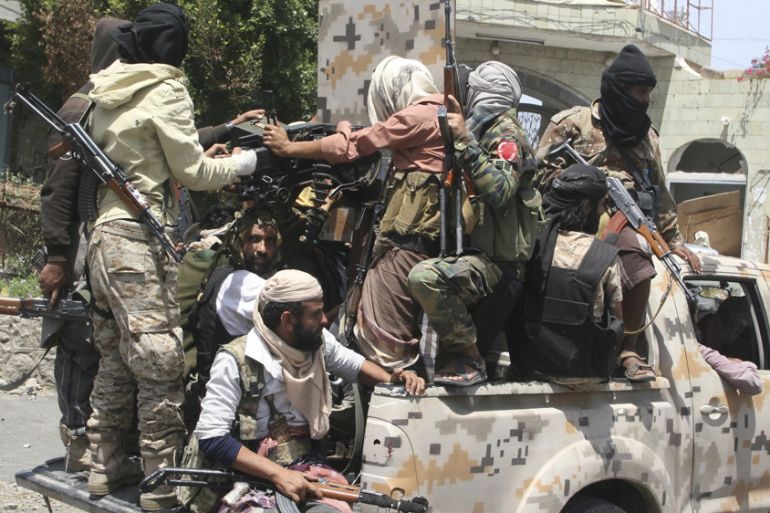Yemen: Raid kills 18, Hadi rejects UN envoy’s proposal
Air strike by Arab coalition in third-largest city comes as President Hadi balked at the latest peace plan by UN envoy.

At least 18 civilians were killed in Yemen’s southwestern province of Taiz on Saturday by air strikes that struck several homes, local officials and residents said.
The raid targeted the al-Salw district where Houthi rebels and government forces backed by a Saudi-led coalition are fighting for control. Taiz is Yemen’s third-largest city with an estimated pre-war population of 300,000.
Security officials told the Associated Press news agency that one air strike hit the house of a citizen named Abdullah Abdo, killing 11 family members.
Taiz, the cultural centre of Yemen, has been torn between coalition forces and the Shia rebels. The district that came under attack is close to the frontline of fighting, and officials said it is often difficult to distinguish rebels from government forces.
|
|
There was no immediate comment from the coalition, which launched a military campaign against the Iran-backed Houthi fighters and their allies in March last year to support President Abd-Rabbu Mansour Hadi’s government.
The rebels seized the capital, Sanaa, in 2014 and eventually forced Hadi out of Yemen.
A Yemeni official loyal to Hadi’s government said two coalition air strikes hit three adjacent homes by mistake.
“All those in the houses were killed,” he told AFP news agency, adding that a child and seven women were among the dead.
The air strikes came as Hadi rejected the latest peace proposal submitted by UN envoy to Yemen Ismail Ould Cheikh Ahmed on Saturday, even refusing to receive it as he met a mediator in Riyadh.
The contents of the plan that the UN envoy already presented to the rebels on Tuesday have not been made public.
According to a copy of the proposal seen by Reuters news agency, the plan would sideline Hadi and set up a government of less divisive figures.
The proposed deal reportedly gives the Houthis a share in the future government in exchange for a rebel withdrawal from major cities.
“The ideas presented … carry the seeds of war,” a statement by the presidency quoted Hadi as saying. “It rewards the coup leaders and punishes the Yemeni people at the same time.”
October 8 strike
The Arab coalition has come under mounting international criticism for the high civilian death toll from its bombing campaign.
An October 8 strike that killed more than 140 people attending a funeral ceremony for the father of a rebel leader in Sanaa drew widespread condemnation, even from close Western allies.
READ MORE: ‘More than 1,400 suspected cholera cases in Yemen’
The coalition launched an investigation into that attack and acknowledged one of its warplanes had “wrongly targeted” the funeral based on “incorrect information”.
It announced disciplinary measures, compensation for the families of victims, and allowed the most seriously wounded to be evacuated on board an Omani flight.
The Saudi-led coalition has been fighting Houthi rebels and forces loyal to former president Ali Abdullah Saleh, who hold much of the north of Yemen, including Sanaa, since March 2015 to try to restore the internationally recognised Hadi to power.
The war has killed nearly 7,000 people, mostly civilians, and displaced three million others.
The Arab world’s poorest nation had already been suffering from high rates of malnutrition, but the fighting and a blockade has pushed the country deeper into starvation and turmoil.
|
|